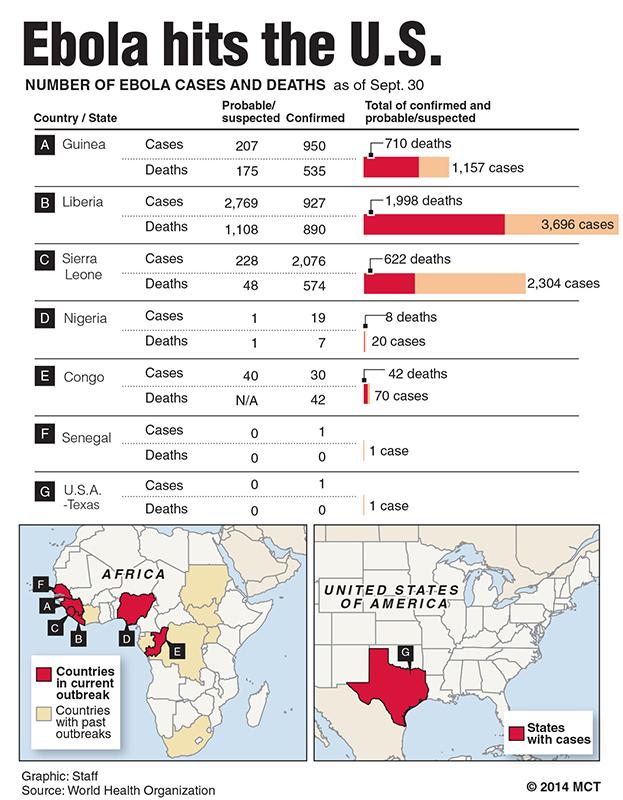There is a pandemic in this country. A real, measurable phenomenon; it’s a dangerous virus that has the power to tear apart our society. No, it isn’t Ebola. It’s the fear mongering we see everyday on television news.
Yes it’s true, Ebola is here in the United States. What isn’t true is that you’re likely to be infected.
Right now there is one man, Thomas Eric Duncan, diagnosed with Ebola in Dallas, and although many doctors and other experts have appeared on news stations to debunk the fear of an outbreak in the U.S., television news doesn’t appear to be buying any of these “facts.”
Why do they refuse to believe what the experts are telling them? Because it drives up ratings.
Think about it, which newspaper would you be more inclined to pick up — “Ebola in America!” or “Everything is going to be fine”?
No news means no ratings. No ratings means no advertisers. No advertisers means the companies can’t pay their bills.
That’s why you’ll be drowned by “breaking news” graphics, and have the privilege to watch people on TV — with no expertise in the medical field — talk about how they’re “scared” of Ebola. If they’re scared, so will you be.
I have no medical expertise either, but when news networks can’t find an expert who agrees with their fears on live television, maybe it’s because there isn’t an expert that does agree.
It’s hard, I know. Watching news is like watching a Michael Bay film, it’s non-stop, high-paced “breaking news” with non-experts speaking freely about scary things in the world. Who wouldn’t be drawn in by such hype?
With 3,400 reported deaths from the virus, the Ebola outbreak in Africa is the worst the world has ever seen. In the United States the death toll is at zero. Duncan is the only confirmed case in Dallas, and he is in critical condition.
Although the Centers for Disease Control and Prevention quarantined around 80 people that Duncan may have had contact with, no one else has shown symptoms of the disease, because it’s not as contagious as the news media would have you believe.
Experts have said they aren’t expecting more people to have contracted the disease from Duncan. If there is an additional case, doctors have said it’s likely to be one at most.
It’s simple, really. These news stations don’t do hard hitting journalism. The people on TV are just talking heads masquerading as journalists to help you forget the fact that you’re lining their pockets with good ol’ American-capitalist cash.
The people on TV that tell you to be deathly afraid of catching Ebola aren’t even journalists. The real journalists covering Ebola are in Africa to see the devastation firsthand.

There was a case of an NBC freelance journalist contracting the disease last week; 33-year-old Ashoka Mukpo contracted the disease in Liberia. He’s a man devoted to his trade of photojournalism. Mukpo is the real journalist, not the pundits in the U.S. using what people like him do to spread fear.
The people risking their lives to show the world what’s happening are the people we should be listening to and watching, not the people sitting comfortably in New York or Washington D.C. who go back to their million-dollar homes at night.
What we need to be doing is remaining calm. Some of the most devastating damage can be caused by panic.
Don’t run to your local pharmacy and buy out the shelves like we see happen in movies. Because, remember, there is no cure for Ebola, so it’s already an exercise in futility.
If you’re really scared of Ebola, just get your daily needed amount of vitamin C and don’t let people sneeze into your mouth. Which is actually just good advice for any time of the year.
Some of the best things you can watch on television are the shows that are built around mocking and debunking television news and government. Shows like “The Daily Show,” “The Colbert Report” and “Last Week Tonight with John Oliver,” which are not intentionally real news shows, give you some of the most accurate information on television.
These satirical news shows have become the fact-checkers of the world.
Last week, Stephen Colbert had on Dr. Kent Sepkowitz who is an infectious disease specialist at Memorial Sloan-Kettering Cancer Center.
During the comedic interview, Sepkowitz gave some real, albeit funny, medical advice. He said, “… It’s very clear that the amount of virus is sky high in someone who’s infectious, and that the only way to get infected is to touch that blood bare-handed or to smear it on your face…”
The show always has a funny interview, but it comes with vital information. In this case, Dr. Sepkowitz said the odds of Colbert getting Ebola were zero and called the news media a fact-less “punditocracy.” He even said President Barack Obama’s statement that an outbreak was “unlikely” is wrong, saying that there won’t be an outbreak in the U.S. period.
The point is, don’t spend a ton of time worrying about Ebola. It’s not going to get you.






Horus9339 • Nov 26, 2014 at 2:34 pm
Bird flu anyone? Total BS once again.
Horus9339 • Nov 26, 2014 at 2:31 pm
Idiots
NoSoupForYou • Oct 18, 2014 at 3:31 pm
Largest US cities with people from West Africa will have the most travel and pose the greatest risk:
http://www.towncharts.com/Ebola-Top-500-Cities-in-the-US-for-Total-Born-People-From-West-Africa.html
A travel ban would help us control the Ebola outbreak.